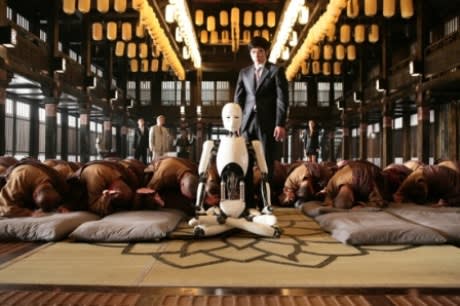Even the most tired conventions of apocalyptic storytelling can be revitalized by alternate perspective. Talented South Korean genre manipulators Jee-woon Kim (I Saw the Devil) and Pil-Sung Yim (Hansel & Gretel) have pulled an impressive feat with Doomsday Book, grounding the arch drama of familiar end of the world scenarios within the context of an anthology film. Moreover, they've done so with a strong sense of humour that deftly juggles naturalism with absurdity and deeply probing philosophy.
Divided into three thematically connected chapters, Doomsday Book commences with "A Brave New World," a unique take on the collapse of society via zombie outbreak. Chapter director Yim slowly allows the darkly funny tale to unfold from the perspective of patient zero, establishing a quirky family dynamic and setting up a romantic entanglement before the overt critique of gluttonous consumer culture gets bloody. Both themes reach comical macabre resolution within the context of the undead plague, mirroring the habits that keep people from experiencing life—like documenting every moment with digital pictures instead of organic memory—in the compulsive behaviour of walking corpses. There is no grand climax to the story; life simply goes on.
The tenacity of life in the face of daunting change is the common thread binding the chapters together. "Heavenly Creature" takes a more subtle approach to this idea than its companion pieces. It's also by far the strongest narrative. In fact, it's the most thought provoking example of deliberately considered science fiction philosophy since Duncan Jones's superb and introspective, Moon.
A technician from Universal Robotics is called in to examine a "defective" robot designed to handle finances for a monastery. It's not a glitch in his computations that causes concern rather, the artificial intelligence has gained sentience and achieved enlightenment. The perceived threat this poses to the power holders of both corporate and religious interests creates compelling philosophical drama that avoids clichéd sentiment in favour of a deeply humanistic viewpoint that fingers learned artifice as the chief roadblock to spiritual evolution. Taking this tact to the material is refreshing since nobody needs another Pinocchio story of an uncluttered consciousness desperate to cloud its rationality with messy human emotion.
While the brilliant centerpiece alone is worth the price of admission, Doomsday Book wraps up with an absurd send-up of the "meteor of destruction" scenario, which points to the dangers of implicitly disregarding unconventional thought (another strong theme that runs through this consistently well-directed sci-fi triptych). Sure, "Happy Birthday" is mostly played for laughs, but it does a great job of depicting the inevitable breakdown of social niceties when the end is nigh.
Kim and Yim make the most of a limited budget, crafting stunning images and beautiful compositions that punctuate, rather than overwhelm the warty, poignant interpersonal drama that imbues the fantastic with uncommon honesty and soul. Rather than fret about a need to save the world, thus preserving the status quo, Doomsday Book gracefully points out that every end is also a beginning.
(Well Go USA)Divided into three thematically connected chapters, Doomsday Book commences with "A Brave New World," a unique take on the collapse of society via zombie outbreak. Chapter director Yim slowly allows the darkly funny tale to unfold from the perspective of patient zero, establishing a quirky family dynamic and setting up a romantic entanglement before the overt critique of gluttonous consumer culture gets bloody. Both themes reach comical macabre resolution within the context of the undead plague, mirroring the habits that keep people from experiencing life—like documenting every moment with digital pictures instead of organic memory—in the compulsive behaviour of walking corpses. There is no grand climax to the story; life simply goes on.
The tenacity of life in the face of daunting change is the common thread binding the chapters together. "Heavenly Creature" takes a more subtle approach to this idea than its companion pieces. It's also by far the strongest narrative. In fact, it's the most thought provoking example of deliberately considered science fiction philosophy since Duncan Jones's superb and introspective, Moon.
A technician from Universal Robotics is called in to examine a "defective" robot designed to handle finances for a monastery. It's not a glitch in his computations that causes concern rather, the artificial intelligence has gained sentience and achieved enlightenment. The perceived threat this poses to the power holders of both corporate and religious interests creates compelling philosophical drama that avoids clichéd sentiment in favour of a deeply humanistic viewpoint that fingers learned artifice as the chief roadblock to spiritual evolution. Taking this tact to the material is refreshing since nobody needs another Pinocchio story of an uncluttered consciousness desperate to cloud its rationality with messy human emotion.
While the brilliant centerpiece alone is worth the price of admission, Doomsday Book wraps up with an absurd send-up of the "meteor of destruction" scenario, which points to the dangers of implicitly disregarding unconventional thought (another strong theme that runs through this consistently well-directed sci-fi triptych). Sure, "Happy Birthday" is mostly played for laughs, but it does a great job of depicting the inevitable breakdown of social niceties when the end is nigh.
Kim and Yim make the most of a limited budget, crafting stunning images and beautiful compositions that punctuate, rather than overwhelm the warty, poignant interpersonal drama that imbues the fantastic with uncommon honesty and soul. Rather than fret about a need to save the world, thus preserving the status quo, Doomsday Book gracefully points out that every end is also a beginning.




